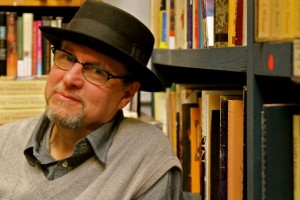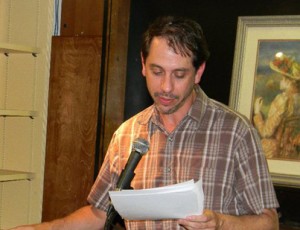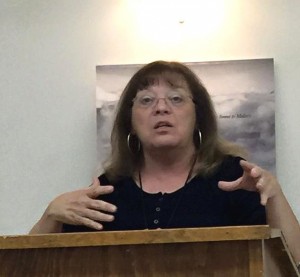THE MAN WHO LOANS TOOLS IS OUT. The hand-lettered sign hung dead center of the rear wall of the cement block garage. Lendon Philpot—the man who didn’t loan out his tools—leaned over the motor of a red ’67 Ford Galaxie, trying his best to loosen the rusted bolts on the red Ford’s water pump. Yellow jacket wasps buzzed his face every time he squirted solvent on the stubborn parts before yanking his hands, arms, and torso in a gut-wrenching tug.
The group of men gathered near the red cold-drink machine either sat on mule ear chairs—homemade wooden chairs with two back posts that curved out like mule’s ears—or propped on wooden Coca Cola crates set on end. They watched carefully and marveled, hardly able to believe Lendon wasn’t cursing.
“Lendon’s done got religion.”
“A Ford could cause a man to lose his salvation.”
“A red Ford is Satan’s hand work.”
Lendon gave the wrench one last red-faced monumental tug. His hand filmed with engine grease slipped, crashing his right hand knuckles into a protruding piece of metal that cut a gash at the same time his body shifted in such a way that Lendon’s right cheek pressed on a yellow jacket. It buried its stinger an inch from the corner of his right eye, the catalyst for the show about to occur.
“Son of a BITCH.”
This was more like it. The mule ear chair gang settled in to watch. Lendon shot up out of his crouch over the motor and hit his head on the propped up hood. When he settled steady on his feet beside the car, he danced around like a man who had lost his mind and threw his wrench with such force it glanced the top edge of the Ford Galaxie’s windshield, spidering the glass. Lendon removed the dead yellow jacket from his face with his right hand while rubbing the top of his head with his left, all the while roiling out epithets so fierce that some of the men gathered around the cold drink machine cringed, one whispering “oh no, you shouldn’t say things like that about somebody’s mama, Lendon.”
Clyde Colvin—the member of the gang always given the best mule ear chair not simply because of his advanced age and role as leader and spokesman but mainly because he was by far the best local bootlegger in a dry county—summed it up best. “The devil is present and accounted for this morning.”
A firestorm of commentary erupted from the mule ear chair gang who’d all had at least two cups of coffee from the percolater that sat on a small metal cart beside Lendon’s desk and who were waiting to combust.
“It’s sure hot as hell. August in Alabama might be hell.”
“Not exactly. The Bible describes hell as a lake of fire that will consume the flesh but not end existence or eternal suffering.”
“Pull them shoes off your feet and walk down that black top yonder and see if you don’t think you’re being consumed by fire. Burnt, but not kilt.”
“That don’t make no sense. Only a fool would take his shoes off and walk down the hot pavement in August.”
“Up on top of a hill is where you need to be when it’s this hot. My ol’ granddaddy said always build a house on a hill to catch the breeze.”
“We need to be up on Cheaha Mountain.”
“Yessir. You can catch some breezes up on Cheaha.”
“Ain’t never been to Cheaha, have you, Clyde?”
Clyde paused before speaking. Every man there followed the pause, waiting to see what Clyde would say. “Never seen no need.”
“Hell, man, it’s just over in the next county. Not more’n thirty mile.”
“All you have to do is go out Hollins Road and cut through that road by the Baptist church with the red winders.”
“Naw you don’t. That ain’t the way. Just go up town and turn right at the red light past the bank and go out that way to Clairmont Springs.”
“You boys couldn’t tell a blind man sitting on a toilet how to find his rear. There’s more than one bank up town. And what if the light ain’t red? What if it’s yeller or green? When then? And besides, roads have numbers.”
“Clyde, you still scared of heights? That why you never been to Cheaha? I heard you won’t buy a new pickup ‘cause the new ones sit too high off the ground.”
Everyone had a laugh over that, but Clyde didn’t answer.
A nice-looking young woman wearing a starched and ironed dress and with neat bobbed hair walked up and looked around, wide-eyed. “I’m looking for Mr. Philpot,” she said.
Clyde Colvin stood like a gentleman and nodded in the direction of Lendon. “That would be him.”
When the young woman walked up to Lendon, he who had been cursing like the damned changed gears and smiled like a Sunday school teacher, found a rag in his pocket and wound it around his bleeding knuckles. “Yes ma’am. How can we help you?”
They could all tell just by looking at her she was a good country girl, quiet and the kind who spends hours at hard work tending her garden, her children, and her own business.
“My husband, Pete Boshell, he said for me to drop off his old truck.” She sounded like she was apologizing.
Lendon looked out in the shop yard and didn’t see anyone waiting with another vehicle as her ride, just Pete Boshell’s old blue cattle truck left where she had parked it.
“You got a way to get home?”
“No sir. I’ll be walkin’. Ain’t but ‘bout a mile.”
Lendon turned to the men whose mouths were for the most part hanging open. “How ‘bout one of y’all fetch the keys to my truck there”—he nodded in the direction—“and drive Miz Boshell home. Too hot to be out walking bareheaded, and I suspect Miz Boshell’s got plenty a work at home just waitin’ on her.”
Lendon saw his portly cousin Hubert, one of the mule ear chair regulars, wobble out of his chair so fast he turned it over backwards on his way to the peg board that held keys in the corner that Lendon called his office.
Lendon continued. “Pete Boshell’s a hard-working man.”
Every man there knew Pete Boshell was one of the locals who arose before dawn every morning to tend whatever cattle he had that season on his few fenced ragged acres, eat breakfast, and be on the job up at the cotton mill in Sylacauga for the seven AM shift.
“Least we can do is keep his truck running for him.”
Of course every man there also knew that it was Pete Boshell working at Avondale Mills right over the county line that provided the money to pay Lendon Philpot, who was not in the business of handouts unless it was that time the school bus broke down right in front of his shop and he gave all the kids free cokes and snacks from his Lance cookie jar, which was a different story altogether. Lendon hated to see a preacher coming is what he told the mule ear gang. Especially Baptist preachers. They always thought you should do their work for free and expect nothing more than a prayer in return. Money was always hard to come by in Coosa County. You had to bring money into the county, not the other way around.
Lendon believed in hard work, keeping moving, lining up the jobs and the day’s work. That’s how a man got ahead in the world. A few years back he’d had four bays in his shop, but it was too much to juggle, having three mechanics besides himself on payroll and the shop yard lined with so many cars needing repair that it looked like a used car lot. Plus, with all those cars parked around all the time, some rumored he was bootlegging. And when he had to drive the five miles up town to pick up parts in his pickup, upon his return he found no work at all had been done. So he’d closed up the two back bays, parked his tow truck in one, and kept the one mechanic Billy Banks who worked slow but steady and could rebuild a transmission better than new. And Lendon set to giving responsibilities to the changing brigade who sat around in the mule ear chairs, never doing anything but watching him work, swapping lies about cars and fishing, and waiting to see if Lendon would pitch a conniption fit or join them. He did join them about four every afternoon when the men all bought short cokes in thick glass bottles from the machine that still just charged a dime. The cokes were just to chase the swigs of whiskey each man took from whatever bottle Lendon Philpot had stashed in the bottom right drawer of his desk. They would pour the neck out and fill it up with the flavor whiskey of the day. Thanks to Clyde Colvin. And no one knew exactly where Clyde got his stash, though many—including state law enforcement—had surmised. Local law enforcement didn’t have to surmise since Clyde was paying them off to let him know when state or federal law might show up.
But it was just midmorning, a long time until four p.m. The day was already so hot the heat shimmered off the black top on the highway out front, and burning sweat rolled into Lendon’s eyes.
Lendon was in pain but attacked the Ford again, this time with more focus, as if sheer human will could tame it. The Ford had been nothing but problems. When Billy Banks changed the oil in the red Ford and the oil plug was stuck, he’d stripped it as he forced it out. Then there was an electrical short in the starter that had plagued the car for months. Lendon had replaced the starter twice and had checked for other shorts in the wiring. Each time it appeared he’d fixed the car. But when the owner’s wife drove the red Ford to the grocery store and bought ice cream, the starter had another spell, stranding her with melting ice cream in a hot parking lot. Lendon began to think of the red Ford as an epileptic whose attacks were unpredictable. And now this episode with the water pump. Plus when Billy Banks had sat in the driver’s seat of the red Ford to drive the car into the bay, a screwdriver he forgot he put in his hip pocket punched a hole in the upholstery and ripped it a couple of inches. Lendon was back under the hood, wrestling with the water pump, the mule ear chair gang watching and taking turns narrating.
“I wouldn’t have no ’67 Ford Galaxie if somebody give me one.”
“Cars gotta be sexy now. It’s all about the Mustang, all right.”
“Especially a red Ford Galaxie. They’s the worst kind. Wouldn’t have one.”
“Half them Fords these days turn into great big fireballs in a wreck. Like them Pintos. Death traps on wheels. That Corley gal over near Clanton and her little sister burned up in one of them Pintos. Wasn’t their fault. Hit from behind.”
“I wouldn’t let my dog drive no Pinto”
“Since when did your dog start driving, Charlie?”
“Just give me a good Chivolet, anytime.”
“Yessir. A good Chivolet.”
“General Motors.”
“Yessir. GM. All the way.”
The mule ear gang was better than a chorus, singing Lendon’s own sentiments back to him as sweat dropped from his brow onto the Ford’s dusty motor. By the time Lendon had the old part off and the new part on, he was red-faced and his eye had swollen close to shut.
“Back it out, Billy,” Lendon called.
Billy Banks wiped his hands with a clean rag and crawled into the driver’s seat of the red Ford once again.
Lendon went over to the water cooler and drank his fill, the chorus calling to him.
“Hey, Lendon, come over here and let Charlie here look at that eye for you.”
“You know I was a medic in the army.”
“Wet tobacco’ll take that sting out.”
“I don’t believe nobody would want none of that chew out’n your mouth.”
“Take that Prince Albert can in your pocket and dribble some water on a wad —let it get good and wet—then put that wad up against the stung place and tie a handkerchief over it.”
“Well, now, hold on. I heard you take kerosene and sprinkle that on some clean Prince Albert and tie that on the stung place with a clean handkerchief.”
“That don’t make no sense at all. The yellow jacket stung him up side the eye. You want me to blindfold him?”
“Course I ain’t sayin’ blindfold him. How can a man walk around—even in his own shop—if he’s blindfolded?”
About that time Lendon heard a loud sickening sound of metal crashing into metal and turned, expecting to find that some poor unsuspecting soul had slowed down on the highway to turn into the gravel yard of Lendon’s place of business and been hit from behind by a speeding tractor/trailer, its driver hellbent on making his load to Montgomery on schedule. Instead, what he saw was Billy Banks at the wheel of the red Ford with his face moving in rapid sequence through five emotions—surprise/disbelief/outrage/anger/fear. The rear end of the red Ford sat mashed into the side of Pete Boshell’s old blue cattle truck. Even from this view, Lendon could tell the red Ford had more damage than just a broken taillight. The rise of the trunk lid was now at an angle more like that of a chopped off race car, only crooked.
Billy Banks stumbled out of the car. “I swear I had my foot on the brake, Lendon. I swear. I took it off the gas and put it on the brake. It was like the car was possessed or something. I couldn’t stop it. It was like it had a mind of its own.”
Clyde Colvin was standing right beside Lendon now, his hand on Lendon’s shoulder, helping Lendon survey the damage. “Well one thing’s for sure,” Clyde said.
“What’s that?”
“Pete Boshell’s truck sure as hell stopped it.”
* * * * * *
“Paint’s going bad anyway. Hood’s already turned pink.” Clyde Colvin, trying to hold up his end of a one-sided conversation, sat behind the steering wheel of Lendon Philpot’s truck. Lendon sat with his right arm perched in the open window, staring ahead and occasionally offering one word answers. Between them on the seat, a brown paper bag held potted meat, sardines, Saltine crackers, and a bottle of hot sauce Clyde had stopped and picked up from the store down the road from Lendon’s shop.
“Not even a real air conditioner they’re running in that thing. It’s a aftermarket. And them kind don’t never work too well. Or last too long.”
After Billy Banks had backed the red Ford into the side of Pete Boshell’s cattle truck, the mule ear chair gallery had waited for the fireworks show that was sure to follow. Talk halted and all eyes and ears were on Lendon.
But Lendon had not chewed out Billy Banks or fired him on the spot or thrown wrenches or turned even redder in the face than he already was. He had not launched into his usual creative spontaneous recitation of curses invented on the spot to fit the circumstances, curses so rich in imagery and rhetoric as to awe those whose ears were already accustomed on Sundays to hearing the very best preachers describe sinners in the lake-of-fire hell in the hands of an angry God in such a histrionic manner as to bring even the most stubborn-willed sinners to their knees. Lendon was more entertaining than a preacher and didn’t even pass the plate for an offering. The mule ear chair gang hung in suspended motion awaiting the show of shows. But no. Lendon simply turned from where he and Clyde surveyed the crushed rear end of the red Ford Galaxie, went to the tiny sink in the bathroom at the back of the garage, poured kerosene onto his hands from a coke bottle sitting in the corner, and proceeded to lather up his hands thoroughly with Gojo and rinse them before taking out his pocket knife to clean under his finger nails. Then he walked right past the mule ear chair gang as he dried his hands with a clean shop rag, walked to the oak office chair beside the desk in his office, sat down, and began shuffling papers.
The gang looked at each other and made themselves busy whittling, rolling cigarettes, cleaning out a pipe with a pocket knife, inspecting the freckles on the backs of their hands, one taking a comb out of a pocket and smoothing his hair.
Billy Banks shuffled over from the work bench where he’d returned after backing the red Ford into the truck to stand in the framed two by fours that passed for Lendon’s doorway, as if offering himself as a sacrifice.
Lendon had not even looked up at Billy Banks.
Lendon’s pattern was not to sit at his desk in the middle of the day. Even at the close of the day when he went into his office to retrieve the whiskey bottle du jour from the desk drawer, he didn’t sit down for long. Now he sat . He looked at the big stack of billing tickets—money people owed him—he kept speared onto a tall steel spike anchored by a heavy iron plate bottom that sat on his desktop. He had taken off the entire stack and studied each one individually, as if checking his math before stabbing it back onto the steel spike. This had gone on for a good twenty minutes.
At that point, Clyde Colvin had taken his cap off the back of the mule ear chair he sat in, perched the cap on his head in the jaunty angle he wore it, and stood in Lendon’s door. He opened up his pocket watch and looked at it.
“C’mon, Lendon. Time to go up town to the parts houses.”
Lendon looked up at Clyde and then back down at the stack of tickets in his hands for a while before he took the entire stack and pushed them back onto the spike and retrieved his own cap from the peg board and followed Clyde out a front bay door to Lendon’s blue Chevrolet pick up.
Clyde spoke up. “Key’s in it. Guess I’ll drive if it’s alright with you.”
Lendon had not said a word, just opened the passenger door and sat down on the passenger side of the bench seat on which he had ridden maybe a total of twice in the history of the 142,000 unaltered miles on the odometer.
So Clyde had stopped at the store, bought the supplies, and headed north, driving right past the parts houses and right on by the bank and the city hall and turned right and headed out the other side of town where the city limits ended and the boundaries of the national forest began. Since they now drove through copses of tall trees, the air blowing through the butterfly window vents of the pickup was not exactly growing cooler, but the shade offered relief from the August sun of a cloudless sky, and Clyde had started talking and kept right on doing so, though he was getting little response other than an occasional grunt from Lendon.
“I know for a fact that the driver’s side window in that Ford quit working about six months so that ever time it rains the seat gets wet. When the sun bakes it dry, it just rots the whole thing. So Billy’s screwdriver might not even been what split that seat. And have you heard them brakes? They squeal like a stuck hog.”
Clyde continued. “Now the front windshield being broke, that part is your fault all right.” Clyde looked over at Lendon. “Other than a few road chips, that glass was sound as a dollar until you took that wrench and slung it. Nobody’s sayin’ you meant to break it, but you know what I mean.”
Clyde kept right on talking as he guided the truck through the turns and curves, driving by the old springs where the folks with money used to come stay at the old hotel and take the baths for whatever ailed them, then driving right on up the side of the mountain. They passed fields abandoned so long with no one to bush hog that the saplings had taken over. They passed fields planted in straight rows of pine for pulpwood. But mostly they were in deep forest that in places offered a total canopy for the tunnel the road made. Soon they had climbed enough to feel the first cool breeze.
Lendon seemed to come out of his trance. “Where the hell you going, Clyde?”
“I guess where I’m going with this is that Billy Banks don’t need to get fired over a red Ford. That car’s been jinxed since it came off the line in Detroit, for one thing. And for another, nobody’s ever done much to take care of it.”
Lendon seemed taken aback by the thought. “I’m not about to fire Billy Banks. He’s got a family. And besides, he makes me money. What I mean is right here and right now. In this truck. Where the hell you takin’ me?”
“We’re riding to the top of Cheaha. To catch us a cool breeze.”
Lendon seemed to take this in. “But you’re afraid of heights, Clyde.”
“I ain’t planning on lookin’. And besides,” Clyde reached under the seat and pulled out a flat pint bottle and put it on the seat and then another, “I brought along a little somethin’ to ease the pain of the view.”
So they kept climbing in the old straight shift truck with their arms perched in the windows to catch the breeze, following the CCC road clear to the rock tower the CCCs built on the top and then found a squat oak tree with dense shade across the road from the tower where they parked and hitched the tail gate flat and fashioned a kind of picnic out of the sardines and crackers and potted meat which they ate with their pocket knives and made a big show of having two little Coca Cola bottles prominently displayed in case a ranger happened by. Clyde had put one pint bottle back under the seat and kept the other stashed in the front of his overalls, one gallus left loose, and after they finished the food, they threw the debris in an old oil drum left there for that exact purpose, holes punched in the metal near the bottom so that the rainwater would drain and mosquitoes couldn’t breed. And when Lendon said he might as well climb up to the top of that tower, since they were there, and have a look see, Clyde replied that he believed he’d just sit there in the truck and polish off what was left in the first pint, if it was all the same to Lendon.
When Lendon got back into the truck and Clyde had backed the truck out from under the tree and they sat at the edge of the pavement once again, Lendon pointed to a turnoff a hundred yards away.
“Let’s drive over there and check it out.” As they drove out the gravel lane, it was plain to see that this was where the real view was, the sheer drop off that made the mountain seem like the tallest thing in the whole South, anyone would imagine, the valley below stretched out in a faint blue haze with little roads like strips of string and a shiny lake and moving cars looking something like red bugs look crawling up your arm. Clyde drove slower and slower and had almost shut his eyes until Lendon had him pull over at a wide place in the road and had him get out and come around and stand with him with the hood of the truck between them and the drop off. Lendon had Clyde place his hands on the hood to hold on to and started pointing things out to Clyde, the roads/lake/tiny cars. A little band of clouds had appeared in all that blue sky, and in the far distance they could see a gray thunderhead like a child’s fist and Clyde asked him reckon where that was and Lendon said Indiana for all he knew.
Back out at the CCC road, they did not go back the way they had come and instead took the road that seemed to drop off the mountain, the rest of the world laid out before them like a green rug just waiting for them to roll off the mountain onto it. Clyde closed one eye and held the truck between the ditches while Lendon talked about Patsy Cline and Cowboy Copas and Hawkshaw Hawkins all dying in that plane crash and that he didn’t think it was on a mountain like Cheaha, where there had been more than one plane crash, but that still it was not too far away where the plane carrying Patsy had gone down, and one day he and Clyde might just drive up to Camden, Tennessee, and check it out, all the while Clyde holding firmly onto the steering wheel with both hands. As they neared the bottom of the mountain, a man on a motorcycle swerved around the truck and leaned into the next curve before moving on beyond their sight, the only other soul they had seen.
“Now that’s one crazy feller.”
Lendon smiled just a bit. “I rode a motorcycle in ’42 before they sent me overseas. I thought I would get to do that all the rest of my life. Wear a leather jacket and a shiny pair of boots.”
“We all used to be something or other. Just none of us knowed what we’d end up being.”
At the bottom of the mountain, Clyde opened both eyes for the first time and reached under the seat for the second pint bottle.
*******
When Lendon and Clyde returned, everything was as before. The rear of the red Ford Galaxie still sat crushed into the side of the sturdy metal frame of the bed of blue cattle truck, which seemed relatively unharmed. The two front bay doors of the shop stood open wide, and in front of the coke machine sat the same circle of men, two or three members of whom had left but others had appeared to take their places so that the tableaux remained unaltered. When Lendon and Clyde walked inside, Billy Banks hovered over the transmission on his work bench. The gang seemed relieved to see them. They had all entertained themselves speculating about wild women, whiskey, alcohol control agents, and fatal car crashes, none of which was reflected in their current comments.
“We’d about done give up on y’all.”
“Was it a flat tire, Lendon? I said it was a flat tire.”
“Billy yonder said the parts truck with today’s shipment was prolly late.”
“Yeah, that’s what Billy said.”
A man smoking a hand-rolled cigarette got up out of the best mule ear chair in order to give Clyde somewhere to sit.
The gang was so busy telling Clyde what all had gone on while the two men were gone that no one seemed to notice Lendon take a gray metal gas can with him when he went out to drive the red Ford over to the edge of the shop yard and lift the hood or even saw him walk back in and replace the can on the shelf, much less watched him walk back out to the car, roll a cigarette and light it before flicking the match in the direction of the red Ford. They did not even see the first flash of flame, but all turned at once when the gas tank exploded like a thing that had flirted flame with petroleum all its life finally to have gone too far.
Next day when the insurance claims man out of Birmingham showed up with his checkbook, the gang sat anxious to answer his questions. First he had talked to Lendon. And now he questioned the mule ear gang. And he had had many questions, maybe ten minutes worth of questions so far.
“So let me get this straight. Was Mr. Philpot with the car when it exploded? Was he sitting in it? Standing beside it? In front of it? Behind it?”
“He had been in it.”
“He had been beside it.”
“And in front of it.”
“I’d say he’d also been behind it. Wouldn’t you fellers agree that he had also been behind it?”
Everyone agreed.
The insurance man seemed amused.
“What did it appear Mr. Philpot was doing in all those places?”
They all looked at the insurance man for a while before somebody spoke slowly, like explaining something to a child.
“Well, this here is a garage, sir. People bring their cars here when something is broke on ‘em. Lendon fixes cars for a living. He walks all around ‘em and crawls all over ‘em all day long.”
The insurance man was not fazed.
“So Mr. Philpot was sitting in the car when it first began to burn?”
The gang looked at each other, some over their glasses. This fool out of Birmingham apparently thought a man could be sitting in a red Ford while it exploded and live to tell about it.
“Nawsir. He had been sitting in it. But he weren’t sitting in it when it burnt up.”
“Could any of you tell me why that car suddenly exploded. Other than the fact that it was a hot day in August.”
“Well that one’s easy to answer. Didn’t have nothin’ to do with how hot it was. Them Fords is bad to burn when they wrecked from behind. Them Corley sisters over near Clanton, they burnt to death in a Ford wrecked from behind.”
“Sure did. Two little gals not doing one thang wrong. Just driving down the road. Then somebody just bumped ‘em from behind and that Ford turned into a fireball.”
“A death trap.”
“A fireball death trap.”
“Just lucky we were all sittin’ here next to this Coke machine or else no telling what would of happened to us.”
“I was a medic during the war, and I can tell you that it would not have been a pretty sight.”
“Had it been a Chivolet, damned thing would still be here today.”
“Pete Boshell’s truck there is a GMC and you don’t see much wrong with it, now do you?”
The insurance man went out to his car in the hot sunlight and sat for a minute before coming back in and handing Lendon a check. “You’re very fortunate, Mr. Philpot, to have had the presence of mind to drive that car to the edge of your property before it just happened to have burst into flames, as luck would have it.”
The gang listened to hear what Lendon’s reply would be.
“Damned straight,” Lendon said. “If it had been inside this shop, your company would be paying for a hell of a lot more than one red Ford.” Lendon slowly looked around and let his gaze linger on his building, the cars inside, all his equipment, his tow truck and his welding truck. He let that sink in real good before he looked the man dead in the eye, shook his hand, and took the check.
Of course, the gang told this tale for years, embellishing the size of the red Ford’s fireball on occasion. In some versions, Lendon barely made it out of the car before it exploded, the hair on his head still smoking as he ran back inside the garage. In other versions, Lendon was back inside the garage and drinking a Coca Cola with them when they all saw the red Ford suddenly burst into flames.
Only some months later did Billy Banks remember to ask where Lendon and Clyde had been that day, before the red Ford Galaxie exploded into another world. It was almost 6 pm, almost closing time, and Clyde had brought his own bottle with him to supplement the usual swigs.
“Cheaha,” Clyde replied.
The gang had a good chuckle over that.
“Naw, we’re serious. Really, Lendon. What kept y’all so long?”
“Like Clyde said. He drove me up to Cheaha. Drove me up there, stood on the top, looked all around, and then closed one eye and drove me down the other side.”
The men laughed.
“Even had a picnic while we were there, didn’t we Clyde?”
They laughed out loud.
“No telling where Lendon and Clyde might take off for next.”
“New York.”
“California.”
“I’m betting Alaska.”
“Lendon’s truck would make it there and back, even with as many miles as it’s got on it, wouldn’t it Lendon?”
Lendon looked at them all and smiled. “You take good care of a Chivolet truck, and it’ll take good care of you.”
It was a line he made up on the spur of the moment but one no doubt he would hear many times repeated to him in return.
 A. M. Garner grew up on the bottom edge of Alabama Appalachia—near Cheaha, the highest point in Alabama–and now lives and teaches on the bottom edge of the Upper South on the Tennessee River in North Alabama. She is fluent in redneck. She has eaten squirrel fried in lard and served with a cup of steaming black coffee. For breakfast.
A. M. Garner grew up on the bottom edge of Alabama Appalachia—near Cheaha, the highest point in Alabama–and now lives and teaches on the bottom edge of the Upper South on the Tennessee River in North Alabama. She is fluent in redneck. She has eaten squirrel fried in lard and served with a cup of steaming black coffee. For breakfast.













